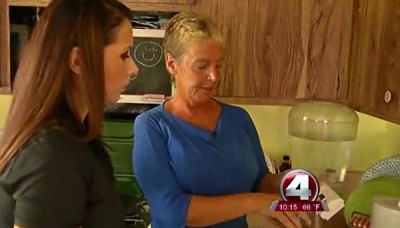
Editor’s note (March 2014): Hear our in-depth interview with Robin Speronis here. [1] Hear her discuss the latest court ruling here [2].
A Florida widow has been ordered to leave her home by city officials because she discussed her off the grid lifestyle [3] with a local TV station.
Robin Speronis decided to live without utilities such as running water and electricity [4] in a modest home in Cape Coral, Florida, but she made the mistake of discussing her lifestyle with reporter Liza Fernandez from Channel 4. The day after the report on Speronis aired, a city code enforcement officer designated her home an “uninhabitable property” and gave her an eviction notice.
“Where is the justice?” Speronis asked. “Why did they choose me, because I was exercising my First Amendment rights of free speech in discussing living off the grid?”
Living Off the Grid in the City
Speronis, a former real estate agent, decided to adopt an off the grid lifestyle [5] in the home she owns after her husband died after a long illness. She cited her faith in God [6] and desire to be self-sufficient.
“It was an interest in empowering myself, like we did when we got off the health care system,” she said. “I wanted to look at every other part of my lifestyle and say, do I need this? Is this of value to me? If it went away tomorrow, what would I do? The more I got into it, the more exciting, the more of an adventure it became.”
When Fernandez visited Speronis’s home in mid-November, she found the house was clean and neat even though Speronis disconnected herself from the electric grid [7] and municipal water. She had even got rid of her stove and her refrigerator and was eating nonperishable food and cooking on a camp stove.
Speronis gets her electricity from solar panels [9], and uses rainwater for drinking [10], bathing and cooking. The rainwater is disinfected with a colloidal silver generator for safety. She uses an antenna to get free Wi-Fi to stay connected with the Internet.
“My message was to create, so I created a happy place,” Speronis told the TV station.
She said she lives for as little as $20 a week.
Living Off the Grid is Illegal
As long as she was willing to stay off the radar, officials didn’t seem to care.
Yet a code enforcement officer found her home and declared it unsafe and unsanitary [11] because it lacked running water and electricity, Speronis said. Speronis alleged that the officer never entered her home or checked to see if it was unsanitary. The official simply posted the notice and left.
City officials said they were simply enforcing the International Property Maintenance Code [12]. That code states that properties are unsafe to live in without electricity or running water. Of course, Speronis does have electricity and water; she simply gets them from alternative sources.
Under the terms of the code, the city could seize the home and evict Speronis.
A city official told Channel 4 that the municipal government is willing let her stay in the home if she can prove conditions are sanitary. The city was willing to compromise because of adverse publicity and a local attorney who was willing to take Speronis’s case on a pro bono or free basis.
Speronis told Channel 4 she was aware of the code and was willing to fight them. She also she was willing to take her case to the highest court in the land as a test case.
Local Government vs. Off the Grid
Speronis’s case [13] should be a wakeup call for those who want to live off the grid. The International Property Maintenance Code and similar regulations are on the books in many parts of the United States and Canada.
Local officials can take code enforcement actions against residents and property owners for living off the grid. Officials in Miami Shores, Florida [14], Orlando, Florida and Drummondville, Quebec have threatened to fine homeowners for growing vegetables in their front yards. Homeowners have been prosecuted for collecting rainwater [15] in a number of states, including Utah and Oregon.
It might be possible to work within the laws — or to get them changed. In many cases, all it takes is a public outcry to get regulations changed or to have officials back down.
Sign up for Off The Grid News’ weekly email and stay informed about the issues important to you [16]
